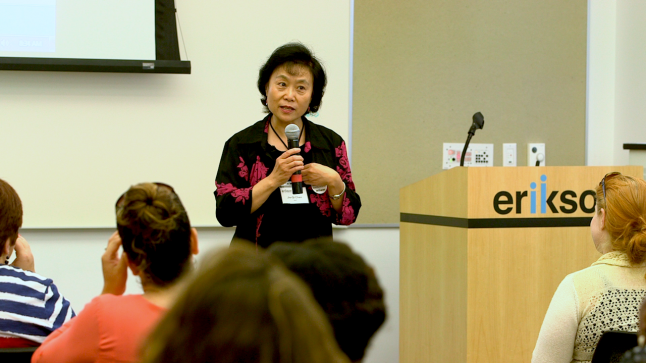Series: About the Collaborative
Early Math Educators Convene for Summer Institute

The Collaborative hosted its first Early Math Summer Institute, themed Meaning-Making in Early Math Education (MEME), on July 7-10, 2015. Over 100 participants took part in rigorous, hands-on sessions that explored the foundational math concepts that develop in pre-kindergarten and kindergarten classrooms.
There were two tracks: one designed for teachers, and another for facilitators. Both tracks explored content in the mornings that included sets, number, and measurement. The afternoons were spent delving into real-world applications for this new knowledge.
For example, teachers spent a portion of their time discussing the benefits of using blocks in the classroom. As simple as they may seem, blocks give children the opportunity to freely explore many important mathematical ideas. Students use spatial reasoning and comparison skills to visualize which pieces they will need for their building project; geometry to discern between blocks of different shape; and even early ideas of algebra, when combining two triangles to make a rectangle.
The teachers were also challenged to use blocks to recreate some of Chicago’s unique architectural details, including the John Hancock building and the bridges over the Chicago River.
This activity mirrored what students often do themselves during free play, allowing teachers to delve into the way children process mathematical ideas in the early years.
“Math is all around us,” one participant said, “and students do mathematical thinking naturally. It is our job to capitalize.” Recent research by the Collaborative supports this sentiment and suggests that teachers’ ability to extract math ideas from play directly affects student achievement.
The Summer Institute also explored sessions specifically for facilitators. Among the topics discussed was the development of the “whole teacher”: a teacher whose knowledge, practices, and attitudes all work towards providing an effective classroom experience for students.
Those in the facilitator track also studied the process of supporting a teacher throughout an entire lesson, from planning the lesson, to observing the lesson in action, to reflecting on what worked and what could be improved for next time.
“I’m developing new ideas and understandings of what I want to keep doing, stop doing, and start doing,” one participant in the facilitator track noted.
The Summer Institute was an intensive, four-day seminar that provided hands-on professional development for over 100 teachers, coaches, and administrators, teacher educators, and professional development providers. They traveled to Erikson’s campus in Chicago, Illinois from such locations as California, Florida, and Ontario, Canada. The material focused on preschool and kindergarten education, based on ideas from the Collaborative’s book, Big Ideas in Early Mathematics: What Teachers of Young Children Need to Know.